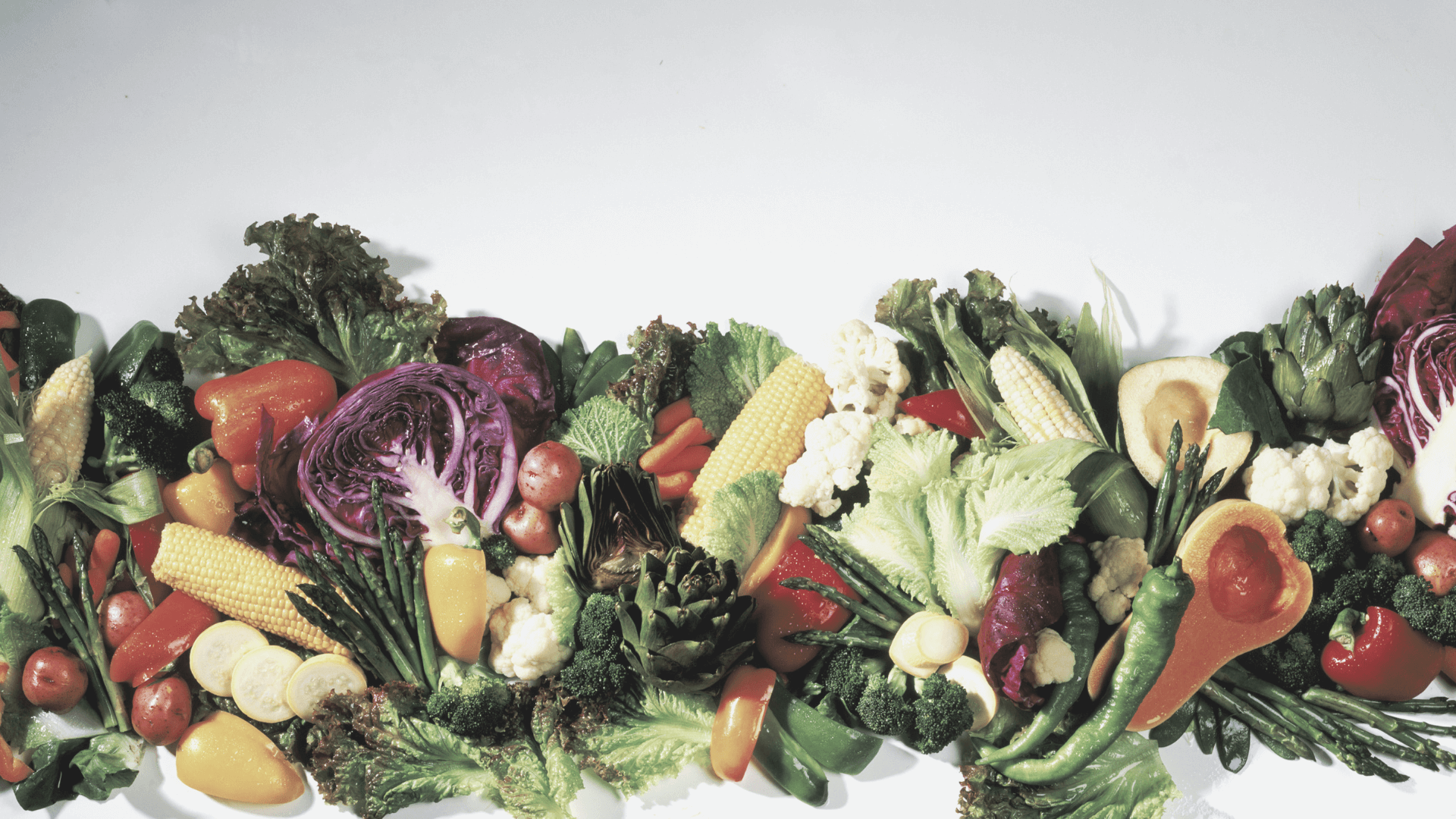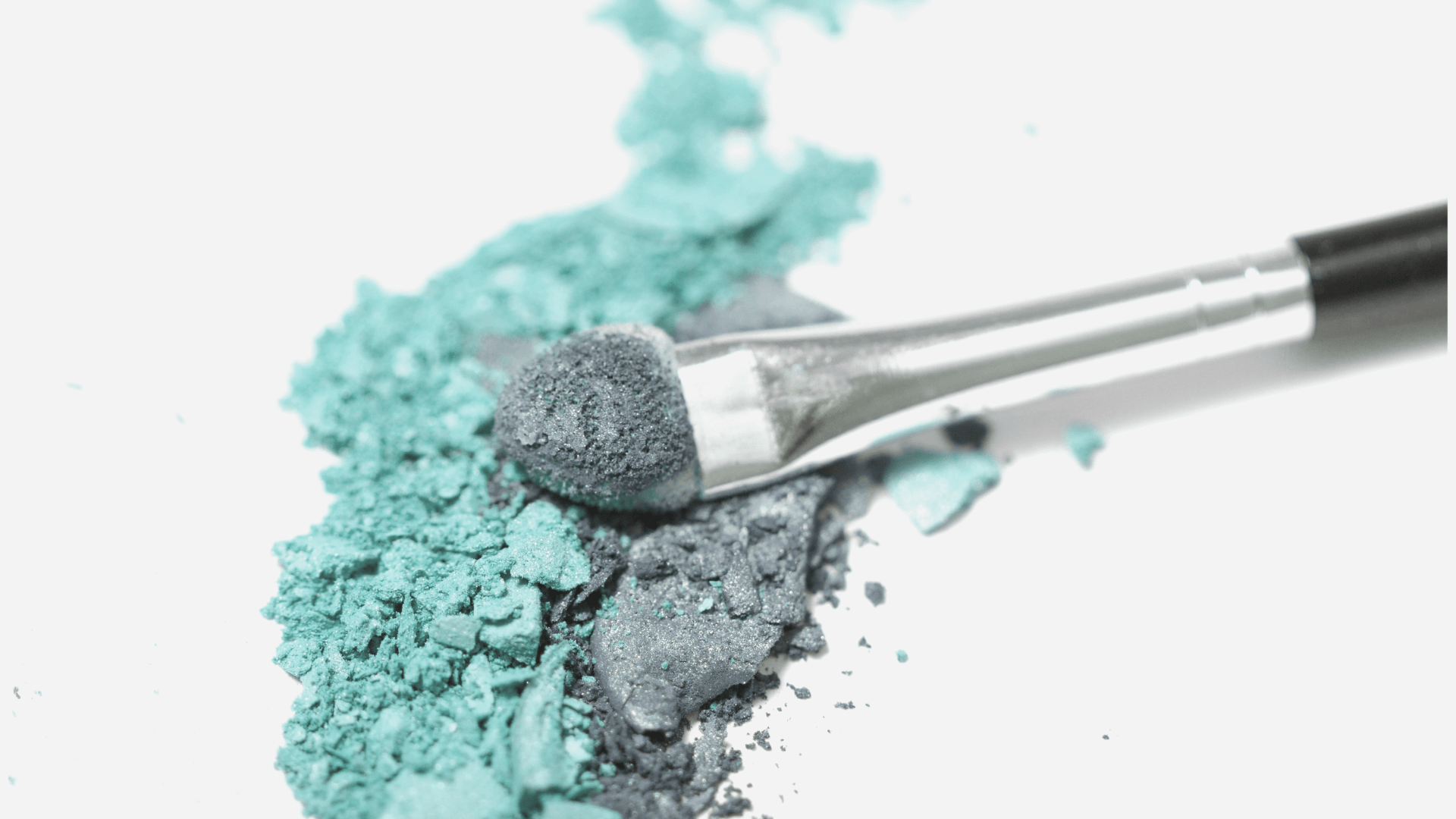Wondering, “Does collagen in coffee break a fast?”
It’s a common question I get, probably because I’m constantly talking about my intermittent fasting practice + the idea of how I drink my morning coffee: coffee + LMNT + collagen. Yes, an easy way to boost the morning cup of joe!
So, today we are going to be diving into the world of collagen, a protein that often receives praise for building hair, skin, and joint health.
While this is all true, collagen has so many more benefits and is such a versatile nutrient to use in our diets.
Let’s get into all things collagen and explore just how important this protein is.
Does Collagen in Coffee Break a Fast? {Your Guide To Collagen}
Click HERE to save this post for later.
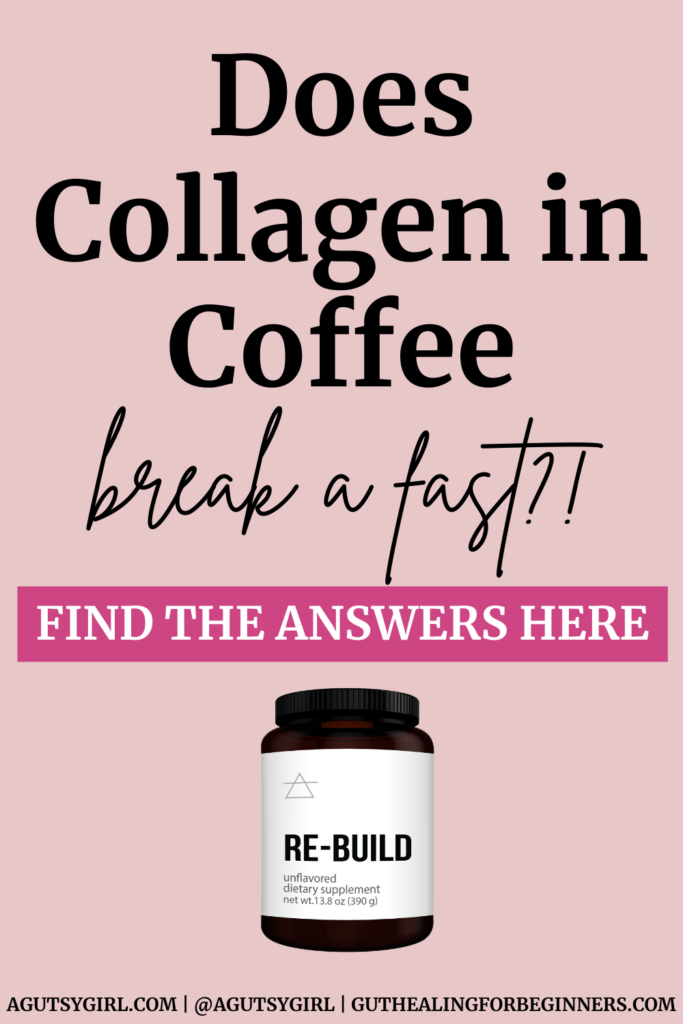
Background on Collagen
So you may know what collagen DOES, but what is it?
Collagen is a protein, meaning it is composed of many strains of different amino acids. It is the most abundant protein in the human body, which makes it a HUGE deal.
All of our connective tissue, such as our joints, cartilage, and even our blood contains collagen as a supporting structure.
Our body naturally builds collagen, but this production can decrease as we get older.
The structure of collagen fibers decays with age which can explain increased issues with joint pain and skin elasticity as we get older.
Functions of Collagen
With collagen’s abundance comes its various functions throughout the human body.
Although we may THINK that we know everything collagen does, advertising often leaves out some of its main benefits.
Here are some of the most commonly known and advertised benefits:
- supports cartilage that protects bones
- supports mobile joint movement and joint health
- builds strong nails and hair
But it actually has so many more functions that we often fail to see or mention. These are crucial to keeping the body in homeostasis, or its natural balanced state.
Here are some examples:
- helps replace dead skin cells
- helps clot blood
- protects organs and prevents damage
- helps rebuild gut lining
- provides amino acids for the body to repair and rebuild damaged cells
- lowers gut inflammation due to amino acid glycine
As you can see, collagen actually plays some vital role across the body that makes it much more than a “beauty” supplement.
It is vital to REPAIRING and MENDING our body, just as any other protein does.
It plays a special part in gut health too, which is why you will find it on many of my recommended supplement lists.
Collagen helps to heal our intestinal lining, which is often damaged due to underlying leaky gut or chronic inflammation.
By lowering inflammation and rebuilding that gut barrier, we better prep our gut for healing and recovering from digestive strain.
It truly is a game-changer!
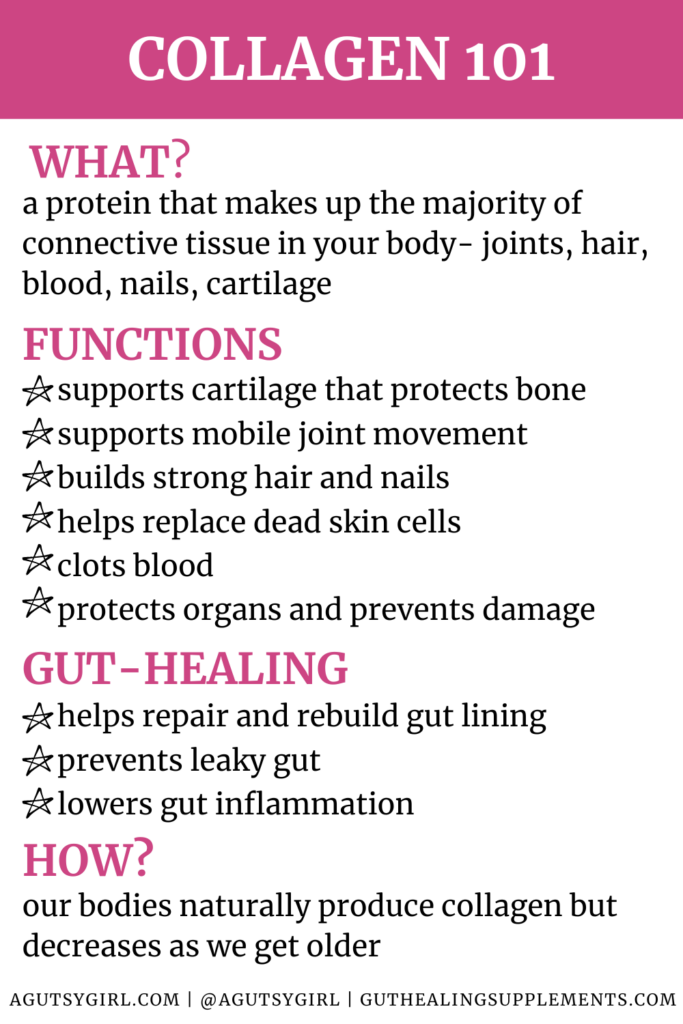
Who NEEDS Collagen?
This is a bit of a nuanced question, as our bodies do all naturally produce the collagen we need.
As I mentioned before, this production does decrease as we age, but often will not occur until after menopause for women or around 60 for men.
Some chronic diseases cause issues with collagen production as well as different lifestyle choices such as:
high sugar and carb diet (Western diet)
carbs attach to protein fibers, which can cause damage to other proteins such as collagen that are in close proximity
smoking
causes harm to collagen and other proteins within cells
unprotected sun exposure
The unprotected sun exposure may be surprising, but the sun can be extremely harmful to the layers of our skin.
Since collagen fibers are found in skin cells, they can often be damaged from prolonged direct sun exposure. Make sure to wear your sunscreen!
These lifestyle choices are a great way to damage your collagen as well as your body’s cells in general! I would advise limiting these factors for optimal full body health.
Signs of Low Collagen
You may be wondering how you will know if your collagen stores are low.
Luckily our body always tells us what we need in terms of symptoms. We just have to be in tune enough to listen and decipher what it is telling us.
Signs of collagen deficiency appear systemically, or across the entire body.
Here are some signs that you may need more collagen:
- Saggy and wrinkly skin
- Joint pain with movement
- Brittle nails
- Muscle regression and aches
- Stiffness and trouble moving
- Thinning hair
A lot of these symptoms overlap with those of micronutrient deficiencies, so it can sometimes be difficult to tell what the underlying deficiency is.
The majority of the time, if your pain is muscular or in your joints, collagen will be your main culprit.
Who CAN Take Collagen?
Anyone.
Collagen is not a dangerous supplement, you just have to be careful not to overdo it. Like any supplement or nutrient we intake, as long as we take it in moderation it provides many health benefits.
A little bit of collagen supplementation intake added to your daily routine can be beneficial for overall health.
Collagen-Rich Foods
This may not be surprising, but foods rich in collagen are animal based products.
Just like humans, animals are full of connective tissue that contain high amounts of collagen.
Some of the highest collagen containing parts include red meats. Any type of animal product that has bones and connective tissue will be quite high in collagen content.
Another collagen-rich food is bone broth! My absolute favorite.
Bone broth is extremely rich in collagen due to simmering the bones and releasing amino acids into the liquid. The protein content from the bones blends into the broth, creating a delicious blend of peptide chains.
Not only is bone broth extremely high in collagen, but it also is incredibly soothing for the gut.
I personally find the best time to drink bone broth to be right before bed, as you can give your body the nutrients it needs to mend and heal overnight.
You can also opt for gelatin, which is actually just a form of collagen. You can add this to vegetable dishes for a little extra texture and all the benefits.
If you’re looking for a complete guide to the differences between collagen and gelatin, you’ll find it HERE.
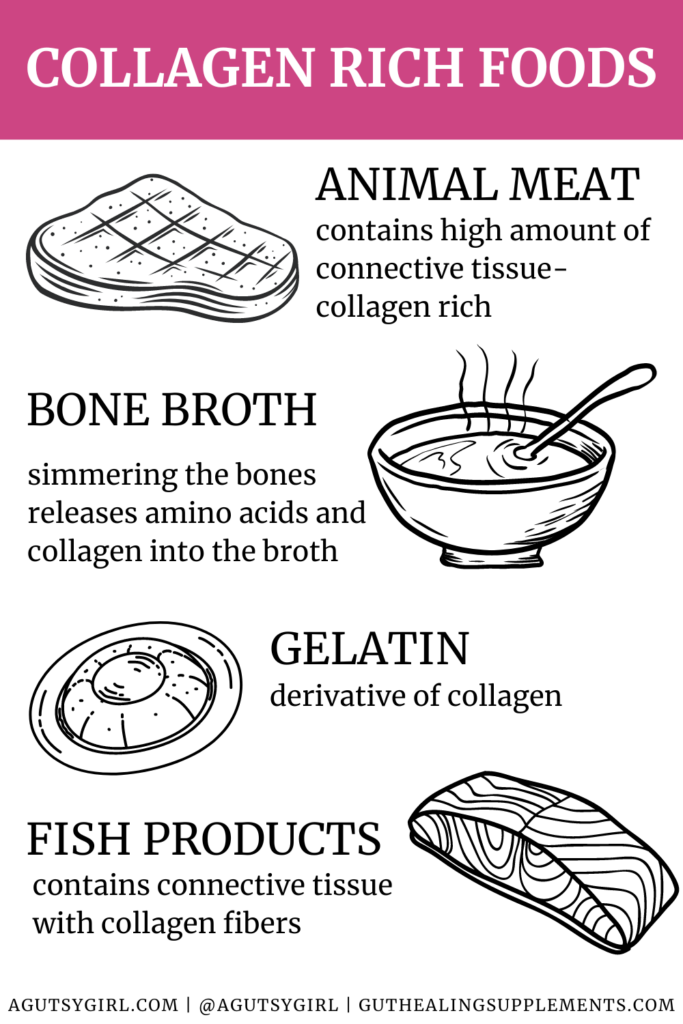
Vegan + Collagen?
Since collagen is found only in animal products, vegans and vegetarians may find the need to look towards nutritional supplements.
Vegan collagen is a rather expensive option, but people do find success with it.
I personally am a bit wary of it, just due to the extensive processing that goes into making it. Anything extremely processed negates a lot of the benefits, so I am not sure I would personally go that route.
Another option is to look for foods that contain the same amino acids as collagen- glycine, lysine, and proline.
Some of these products may include:
- seeds
- nuts
- beans
- soy products
Although you won’t be directly consuming collagen, your body can synthesize these amino acids in a very similar way.
SOURCE: HERE
Collagen Supplements
This is an area that is slightly controversial, as some people swear on taking collagen even without symptoms of deficiency.
Collagen is a very effective supplement for rebuilding the intestinal gut lining, as well as having the other benefits mentioned above.
BUT, you theoretically do not need to take it.
Small studies do support the efficacy of taking collagen supplements for both reduced joint pain and the additional benefits of hair and nail health. However, most of these studies are funded by supplement brands, so it is hard to tell if they are entirely accurate.
Taking it once daily certainly won’t hurt anything and the benefits do outweigh the potential side effects.
And the good news is that we have our own collagen that was created from 3 patented collagen peptides supported by clinical research.
Re-Build
- collagen in the form of powder (so many in the Gutsy community are sick of swallowing so. many. pills.)
- contains a unique blend of three patented collagen peptides supported by clinical research showing their efficacy for supporting collagen production, bone strength, joint health and integrity, skin elasticity, and more
- flavorless with no added sweeteners, making it easyto add to any shake, smoothies, and other foods and beverages, making it convenient to ensure the adequate intake of collagen’s unique amino acids
- gluten-free, dairy-free, soy-free, non-GMO
- contains the research-proven collagen peptide blendsVerisol®, Fortigel®, and Fortibone® derived from specific dietary collagen proteins and produced with proprietary hydrolyzation technologies to optimize their beneficial properties
- Supports healthy bones
- Supports healthy skin appearance and integrity
- Supports healthy joints
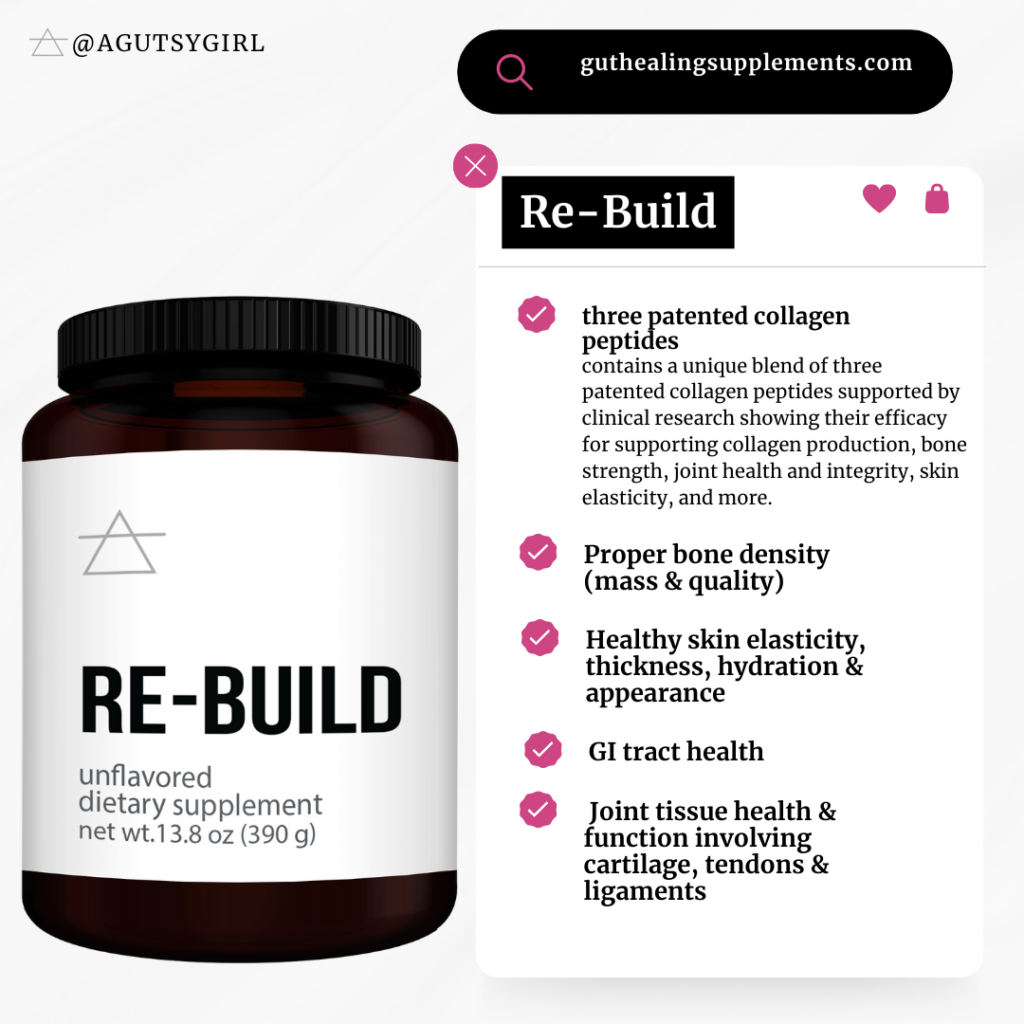
Get Re-Build and use code BLOG at checkout to save 15% off Re-Build and/or any other supplement from guthealingsupplements.com
How To Take Collagen
One of my favorite ways to drink my collagen is to make a bit of a gut-healing coffee.
Now… I CAN tolerate coffee, but I know there are a lot of you Gutsy girls who can’t, so try swapping this out for a low mold coffee alternative or matcha latte. You could also add it to a variety of herbal teas, I just recommend hot beverages for optimal dissolving.
I personally use my own collagen, Re-Build, which is a powdered form of collagen peptides. For each cup of coffee, I’ll add about 1/2 scoop of collagen powder.
It is purposefully unflavored, so I literally can not taste it at all when drinking my morning cup of coffee.
This makes for a delicious and soothing cup of morning joe.
Another option is to take collagen pills, which you just take once a day. Instead of powder, you can just take these like regular medications, with a glass of water.
But let’s chat a little more about simply incorporating Re-Build into your morning coffee.
Will Collagen Break a Fast- Gut Healing and Keto?
There is actually quite a bit of debate on this topic, but the general consensus is that it depends on the TYPE of fasting.
In terms of gut healing, we often turn to an intermittent fasting plan or some variation to help our migrating motor complex sweep throughout digestion periods.
This gives our digestive system time to rest and digest without having to break down any more nutrients.
When looking at fasting from a gut-healing perspective, collagen must certainly will break it. And here’s why….
Collagen protein must be digested by the stomach and small intestine and broken into smaller amino acids for the liver to package and send to the rest of the body. This means that digestion is turned back ON, breaking the “fasting state.”
If your main goal is to not break intermittent fasting, you need to stay away from any food or drink with calories during break periods, as any small amount will break the fast. For best results I recommend waiting at least 4 hours in between meals. This fasting period gives our digestion that break it needs.
Fasting for Keto
In terms of keto, since collagen is a protein and not a carb, your body should not break out of ketosis, or its fat-burning state.
For keto it is recommended to eat a low carb diet, which collagen falls into. The keto diet encourages the use of bulletproof coffee for even more fat burning, which you can combine with your collagen in the morning.
This includes black coffee, MCT oil, and your collagen peptides. This morning coffee recipe keeps your body in ketosis, since it converts the MCT oil directly into ketones.
The touted benefits of the keto diet occur best when your body has low access to glucose and burns fat instead. This means that you can rest assured your body still is burning those cells, even with taking collagen.
I, of course, do not promote any sort of weight loss on my blog, but if this is something you want to learn more about there is so much content online.
Remember, I don’t believe that gut healing is a diet, but rather that one of the benefits of intermittent fasting and/or paying attention to a fasting window can help with overall digestion in order to heal the gut.
My Final Thoughts on Collagen
I personally think collagen is a great supplement to add into your gut healing routine. It supports the integrity of structures across your entire body and helps to rebuild and repair damaged cells.
10/10 would recommend.
Let me know if you end up trying our collagen and what your thoughts are.
If you liked this post, you might also enjoy:
- Best Protein Powder for IBS (Your Guide to Picking the Best Powders)
- Benefits of Fasting for Gut Healing
- A Guide to Collagen Peptides vs Gelatin
Xox,
SKH
Janie Greene is




